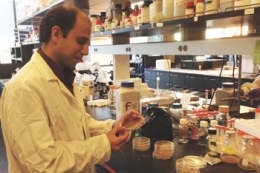
Name
N. Nitin, Ph.D.
Title
Assistant Professor, Department of Food Science and Technology
Institution
University of California, Davis
Education
B.S., Chemical Engineering, Panjab University; M.S., Food Engineering, Rutgers University; Ph.D., Bioengineering, Georgia Institute of Technology; Ph.D., Food Engineering, Rutgers University
What brought you to UC Davis?
I came to UC Davis from the Southwest Research Institute in Texas in 2009 to pursue a research program at the interface of food and health. This research direction integrates my academic and research background in food science and bioengineering. I liked the opportunity to connect food science including food safety with health issues and UC Davis offered an opportunity to start such a program.
How did you learn about the Center for Produce Safety?
I first heard about the Center for Produce Safety from Professor Linda Harris. Dr. Harris informed me about the inaugural Produce Research Symposium held in 2010 at the Mondavi Center at UC Davis. I attended the symposium, was very impressed and sought a way to get involved.
Why did you apply for funding from CPS?
I was impressed with how the request for proposals (RFP) was laid out. I saw multiple areas of focus that matched with my research program and saw an opportunity for collaboration that would directly impact food safety research. It was fortuitous to get funding for a project that could directly impact the industry and provide real-world application. I feel the RFP that the Center for Produce Safety announces each year is one of the best out there; it is very focused and drives researchers and scientists to find real-world solutions that can be applied immediately.
In 2010 CPS funded your project, “Non invasive imaging approaches to evaluate potential infusion of pathogens during vacuum cooling of lettuce leaves and real time dynamics of microbes on leaf tissues as a function of moisture content.” Are there any recent updates from this project?
The results of this project demonstrated that vacuum cooling process does not directly result in increase infiltration of microbes but has a potential to influence microbial localization on a leaf surface in the presence of excess moisture.
What do you think the industry will gain from your research project?
My project pertains to the vacuum cooling process that is used in many packing facilities in the post-harvest stage and will determine potential infusion of pathogens as well as real time dynamics of microbes on leaf tissues. Microbes are very hard to detect and we were able to discriminate microbe location on the plant clearly and determine certain process conditions that can influence microbial distribution on leaf surface.
Where do you see the field of food safety research 5 years down the road? Why?
I see a lot more innovation in the next five years. I see two directions that food safety research will take: 1) An improved fundamental understanding of food microbial interactions and 2) Technologies to rapidly detect pathogens in field conditions. These technologies will lead to more automation and more quantitative analysis. I see extensive collaboration among various diverse scientific disciplines resulting in an improved understanding of food safety challenges and reduced response time to control outbreaks.
What are the key factors influencing this field of inquiry?
One key factor is fundamental decisiveness of food microbe interactions. Another is technological innovations in automation and bioanalysis. The third key factor is a focus on quantitative analysis.
Aside from working in the laboratory, how else do you spend your time?
I spend most of my non-working time with my family. Our three year old daughter keeps myself and my wife quite busy with activities.
Describe one or more of your career highlights.
I recently received the Samuel Cate Prescott Award, which is awarded to young investigators who have shown an outstanding ability in research in an area of food science and technology. I am honored to receive this award. This award highlighted part of my research program that has been supported by the CPS funding. On a day-to-day basis, I find working with and mentoring students that attend UC Davis extremely rewarding.